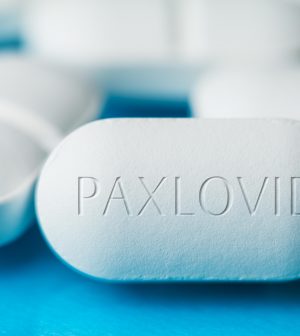- Could Your Grocery Store Meat Be Causing Recurring UTIs?
- Are You Making This Expensive Thermostat Error This Winter?
- Recognizing the Signs of Hypothyroidism
- 10 Strategies to Overcome Insomnia
- Could Artificial Sweeteners Be Aging the Brain Faster?
- Techniques for Soothing Your Nervous System
- Does the Water in Your House Smell Funny? Here’s Why
- Can a Daily Dose of Apple Cider Vinegar Actually Aid Weight Loss?
- 6 Health Beverages That Can Actually Spike Your Blood Sugar
- Treatment Options for Social Anxiety Disorder
FDA Grants Full Approval to Paxlovid to Treat COVID-19

Americans with COVID-19 have been taking Paxlovid since it was approved under emergency use in late 2021. Today, the U.S. Food and Drug Administration granted full approval to the drug.
This approval will allow drugmaker Pfizer to sell the medication at market rate once government supplies are used up.
Paxlovid is the fourth antiviral drug and first pill approved by the FDA to treat COVID. It’s meant to keep at-risk adults from progressing to severe COVID symptoms, including hospitalization and death.
“Today’s approval demonstrates that Paxlovid has met the agency’s rigorous standards for safety and effectiveness, and that it remains an important treatment option for people at high risk for progression to severe COVID-19, including those with prior immunity,” Dr. Patrizia Cavazzoni, director of the FDA’s Center for Drug Evaluation and Research, said in an agency news release.
The approval was made using results from the randomized EPIC-HR clinical trial. That trial studied adults who had a lab-confirmed COVID infection and symptoms but were not hospitalized. They each had a risk factor for severe disease, such as obesity or diabetes, or were 60 years and older. These patients had not received a COVID vaccine or been infected before.
The study found that Paxlovid reduced odds of hospitalization or death by 86% compared to those given a placebo within five days of symptom onset. The patients also did not receive monoclonal antibody treatment.
Among them, 977 patients received Paxlovid and another 989 patients received a placebo. Among those who received the placebo 6.5% were hospitalized or died, compared to 0.9% who received Paxlovid during 28 days of follow-up.
In patients who had COVID antibodies at the start of the EPIC-HR trial, the risk of COVID-related hospitalization or death from any cause during 28 days of follow-up was 0.2% among the 490 patients treated with Paxlovid compared with 1.7% of the 479 patients who received the placebo.
In another clinical trial called EPIC-SR, which enrolled vaccinated patients with at least one risk factor, researchers saw a reduction in the risk of COVID-related hospitalization or death from any cause.
Some “rebound” of symptoms happened in a subset of patients, both those who took Paxlovid and those who took a placebo.
However, there was no clear association between Paxlovid treatment and COVID rebound, the FDA said.
The medication’s label will come with a boxed warning with instructions for prescribers because of some interactions with other medications. Prescribers will need to review these and decide whether patients can still take Paxlovid with some dose adjustments or additional monitoring.
Paxlovid consists of nirmatrelvir tablets and ritonavir tablets packaged together. The most common side effects include impaired sense of taste and diarrhea, the FDA noted.
Although the approval is for adult use, the medication will continue to be available under emergency use authorization for those ages 12 to 18.
Until now, the government has subsidized the cost of Paxlovid, but that is expected to change in the coming months. Americans may soon have to pay out of pocket for the medication.
While the Biden administration has paid about $530 for each course of the medication by buying 20 million courses in bulk, the drug is expected to cost much more when it reaches the open market, Kaiser Health News reported.
At one point Pfizer announced that its COVID vaccine will cost $120 per dose when it is no longer provided by the government, about four times as much as it had previously charged.
More information
The U.S. Centers for Disease Control and Prevention has more on COVID-19 treatments.
SOURCE: U.S. Food and Drug Administration, news release, May 25, 2023
Source: HealthDay
Copyright © 2026 HealthDay. All rights reserved.










